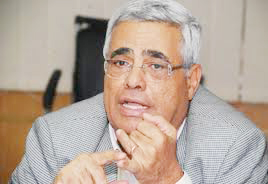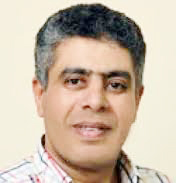Amid the opposition’s calls to shun the upcoming parliamentary elections set to take place in April, writers explored the consequences of boycotting the vote and the negative effect of such a decision on a well representative parliament. In light of the US Secretary of State John Kerry’s visit to Egypt, some commentators condemn the western intervention in Egypt’s internal affairs.
Participating or boycotting?
Hassan Nafaa
Al-Masry Al-Youm newspaper
Nafaa explores the decision of the National Salvation Front (NSF) to boycott the upcoming parliamentary elections. He states that when President Mohamed Morsi called upon voters to go to the ballot boxes on April 22, the aim was to form a balanced parliament that is representative of all political groups.
The NSF’s call to boycott the elections has to be, in Nafaa’s viewpoint, worthy enough. He believes that all opposition parties supportive to shunning the elections should not be negatively affected by this decision; the NSF has to work on convincing a wide spectrum of voters on the efficiency of the boycott, and that avoiding the vote would not affect the credibility or the legitimacy of the elections.
The main challenge in the upcoming elections is not who will dominate the majority of the parliamentary seats, but concentrates on whether or not the vote will manage to push Egypt out of the current political crisis. Amid the many calls to boycott, Nafaa expects that the political dilemma in the country will worsen after the elections.
Therefore, the writer advises the NSF to either change its mind on boycotting the elections, or mobilise all opposition groups, as well as the Salafis, and persuade them to spurn the vote.
Who is the Egyptian agent for the US?
Emad Al-Din Hussein
Al-Shorouk newspaper
Many ordinary Egyptians have found it difficult to answer the question: “Who does the United States support in Egypt?” Do Americans support the Muslim Brotherhood’s Mohamed Morsi, or the liberal Mohamed ElBaradie and his National Salvation Front? Many supporters of the Islamist current accuse NSF leaders of being hidden allies to the US against the Nahda project, created by the Brotherhood.
However, many opposition leaders criticise the US for calling upon the NSF to participate in elections. Some have even condemned the recent visit of the US Secretary of State John Kerry, claiming he is a strong supporter of the ruling Islamist group. Hussein finds it surprising enough to see that senior members of the NSF have protested the American intervention in Egypt’s internal affairs.
Looking at both the Islamist and the opposition sides, the writer says politics entail that Egypt should not cut ties or act negatively against any particular state, especially one as large and influential as the US. Why did Islamists not think that Morsi, their beloved president, did not cut connections with Israel? The plight, according to Hussein, is how most politicians in Egypt look at issues like this as black or white, whereas the origins of the political game is largely played in the grey.





